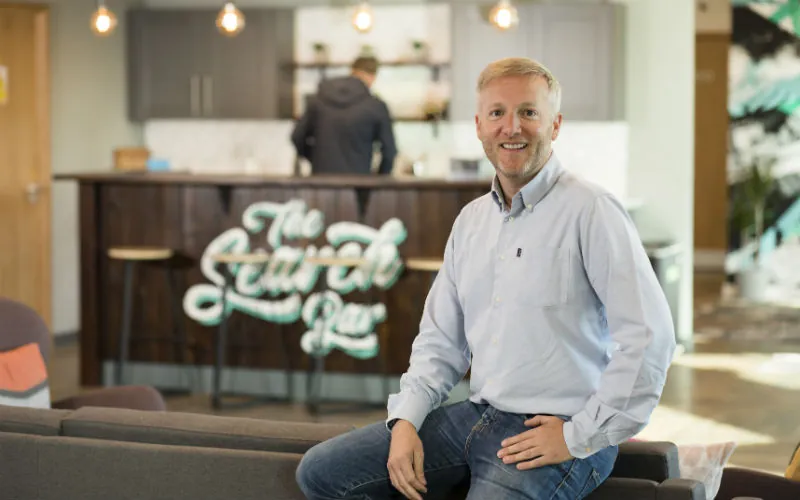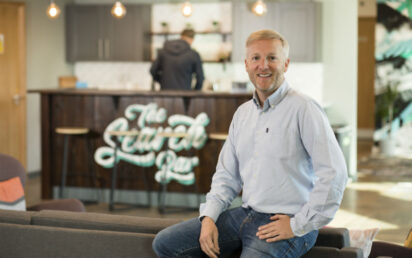Every native tech business has workers at the coalface developing the technologies used by its clients. But are they tapping into the rich seam of ideas within those employees?
One company which has embraced a culture of innovation is Teesside-based Visualsoft. Incorporated back before the rise of Google, the eCommerce agency has evolved its propriety platform with millions of lines of code over the last 21 years.
CEO Dean Benson says the key to staying ahead of the game is to actively encourage people to step forward and pitch. “Ideas can come from the most unusual places,” he tells BusinessCloud at the firm’s Stockton-on-Tees HQ. “It could be the most junior person that comes into the company with an idea. You must create a culture of innovation where people can step forward.”
He cites the example of electric car maker Tesla. “An apprentice scribbled an idea of how to automate a factory line to shave so many days off the factory process. Within 24 hours they’d improved it and she was credited with that innovation,” he says.
With more than 300 employees across Teesside, Newcastle and Manchester, the nuggets which could shape Visualsoft’s future business could come from anywhere. “Having so many staff within the company that program and create and innovate, we’re fortunate we can just keep rewriting code to the latest technology,” Benson adds. “We’re not restricted by having a couple of developers. Supporting old code, rewriting where appropriate, testing and rolling out new code: it’s the circle of life.”
Visualsoft doubled operating profit to £2.1 million on sales of £13m last year. “Most of the profit is used to futureproof for the industry we are in,” explains Benson. “If you stand still, you go backwards. R&D is one of the most important things for our company: without it, you wouldn’t be in business after 21 years.
“Constant technology-driven innovation, not using profits for the sake of extraction for shareholders but using them for driving the company forwards, is essential in any tech business. Every single year with Visualsoft has been amazing and many things have happened along the journey that have got us to where we are today.”
Another example of agile working is an employee who pitched the idea of setting up an arm of the business in Dubai. Visualsoft now counts Coffee Planet among other big-name clients in the region, according to head of brand marketing Vikki Hawkins.
“A member of staff who was originally from the region saw an opportunity there and asked whether they could go and test it,” she says. “We’re starting to see the results off the back of that now: Coffee Planet is basically the Starbucks of the region and we’ve got a couple of other big brand names that have just signed.
“We reckon Dubai is about two years behind the UK in terms of their development of eCommerce – and there is a lot of investment from them as a region on that side.”
To date the only external investment taken on by Visualsoft is a £20,000 loan from Barclays to fund the initial business – a website hosting training courses – and £80,000 from Benson’s parents. The Middlesbrough-born entrepreneur, 44, holds 80 per cent of the business and is the final remaining founder after a 2014 management buyout.
He says a “risky” move towards performance-based marketing three years ago is now paying dividends. Rather than charging a retail client a large fee upfront, the ‘Shared Success’ model effectively partners Visualsoft with them to drive sales which benefit both parties.
It’s a throwback to the company’s first eCommerce site with shoe retailer Charles Clinkard. “It was probably our most pivotal moment,” he reveals of the shift towards monthly recurring revenue. “It’s about putting our mindset back to where it was with the first eComm site: how do we get more revenue and profits to that website? What tools can we write today, what code can we deploy, to make a difference?
“The beauty of it is that we can then roll that across every single client on Shared Success. We’re no longer creating something to try and sell it 1,000 times: we’re creating it to give a genuine return. It means we look at the whole industry and think about how to innovate.”
Today Visualsoft works with more than 1,200 clients. More than one per cent of all UK eCommerce transactions go through its platforms, an annual total of £750m. “That’s a growing number in a growing market as well,” says Benson. “We’ve just finished a five-year strategy and the overriding ambition is to double that market share.
“It could be with our existing clients, new clients or a blend of both – but what gets us there is world class customer service delivered with the platform and marketing that sits around it. And we can’t do that without the people we employ: without them, we’re just a bunch of laptops.”
It is clear that Benson cares deeply for the Tees Valley, which employs 7,000 people in tech and is growing at 17 per cent per year, compared with a national average of eight per cent. He sits on the board of the region’s Entrepreneurs’ Forum and is a governor of Teesside University.
He believes the digital sector should collaborate with education providers, training organisations and universities to ensure businesses have access to a well-trained and agile workforce.
“We give a lot back in terms of the industry that we work in: experience, education, work, apprenticeships,” he says. “We want to get people into the area, into jobs and just help them understand what the future looks like.
“I’ve been working with a number of people in the area, including Teesside Uni, on creating an agile digital skills academy – like a finishing school for tech where you can get your digital skills brushed up. You might have a qualification, but that doesn’t place you a job. It’s that gap that really fascinates me.”
Indeed Teesside Uni students can often be found at the firm’s HQ, as Hawkins explains: “We’re helping them reshape their courses to ensure that their graduates are the best they can be. They can come in here and use our space for a week, and then we have our various teams come down and teach them more about what it’s actually like in practice.
“We take a lot of graduates from that university and that’s the same for all of the digital sector around the Tees Valley. We want them to be work-ready and we need more of them. It’s a real issue.”
The softly-spoken Benson introduced unlimited holidays for staff in 2014 but there is an inner steel to his character. For instance, he once climbed Scafell Pike in the Lake District before work to demonstrate the benefits of flexible working. “I like challenges,” he acknowledges. “I’m really driven. I don’t know if that’s the qualities of an entrepreneur or just of a very stubborn individual!”
He once signed up blindly for an Ironman triathlon – a 2.4-mile swim followed by a 112-mile bike ride and 26.22-mile run – after a couple of pints with a client.
“I had to learn to swim, to buy a road bike and to work out how my legs could move 26 miles. It took nine months of training, nine months of quitting alcohol, nine months of quitting TV. Nine months of pure focus on one event,” he says.
“In both my personal life and professional life, if I set myself a goal, I achieve it – it’s a matter of breaking it down and working at how you get from A to B.”


